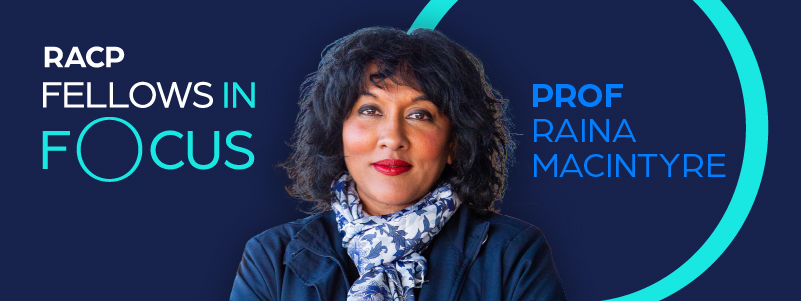RACP Fellows in Focus: Professor Raina MacIntyre
Date published:
22 Feb 2021

Professor Raina MacIntyre is a Principal Research Fellow and Professor of Global Biosecurity. She has a 28-year track record in pandemics, epidemic infections, serious emerging infections, vaccines and control of respiratory viruses. She has also worked as a clinician in hospitals and in health departments on outbreak control. Currently, she heads the Biosecurity Program at the Kirby Institute, which conducts research in epidemiology, vaccinology, bioterrorism prevention, mathematical modelling, genetic epidemiology, public health and clinical trials in infectious diseases.
Raina’s research falls under four areas, namely Personal Protective Equipment (PPE), vaccinology, epidemic response and emerging infectious diseases, and bioterrorism prevention. She is also a dual-specialist physician, with training in epidemiology and modelling. This only scratches the surface of her experience, Raina says she was, "interested in public health, right from the start, even before I did medicine. I was interested in public health as a specialty and the health of whole populations, and I just felt like my career prospects would be more diverse if I specialised."
For 15 years, Raina worked at the National Centre for Immunisation Research, has conducted many vaccine clinical trials and has expertise in vaccinology and vaccine programs, especially vaccination of adults, at-risk and immunosuppressed populations. She is involved in several research studies on COVID-19 and is interested in emerging threats to health security. She has an adjunct professorship at Arizona State University and collaborates with researchers there on global health security.
"I've developed expertise in infectious diseases, pandemics and the control of epidemic diseases. That's really been my focus for most of my career. A lot of my work is on influenza and other epidemic respiratory infections, emerging infectious diseases, etc. It's become important during this current pandemic and where there's actually been a lot of uncertainty, particularly at the beginning. A lot of my research had been on things like PPE, masks, and so on. I found myself in high demand internationally because of my expertise in masks and respiratory protection."
In terms of College activity, Raina was on the Faculty of Public Health Council for three years, looking at the requirements for entry into the training programs, "that was one area of focus at the time, and I had heard from some people seeking a career in drugs and alcohol, for example, that they couldn't get into public health training programs (which is a pathway to becoming a D&A specialist)."
Her illustrious career has not been without its challenges. It’s clear that no matter one’s chosen path, one must always carve out time for one’s self and one’s personal goals. For Raina, the greatest of which has been juggling the work-life balance of being a mother and being on the forefront of infectious diseases. In addition, navigating the difficulties of the ‘expectations’ at home that women are still expected to fulfil, despite having the same amount of work as her male counterparts. "There are exceptions, but in general, most of the domestic duties fall on women despite all the gains that women have had in terms of equality and career opportunities." To overcome these challenges, upon the arrival of child number two, Raina made sure she slowed down, took stock and enjoyed the process.
"I have the philosophy that when you're going through something turbulent or traumatic, you've got to just sit down and go through all the different factors and say, ‘Okay, what of these things is within my control and what of these things is out of my control?’ And then you look at the stuff that's out of your control, and you say, ‘There's nothing I can do about this. I'm not going to lose any sleep over that.’ And you just shift your focus. Don't lie awake losing sleep about something that you've got no control over. All it's going to do is just bring negativity into your life and make you miserable for nothing. So, learning to let go of stuff that you can't do anything about is a really important skill."
For those looking to emulate Raina's career path, she reflects that her path was far from the traditional, ‘expected’ road that some might travel down. Most Fellows who have a FRACP will normally go into a clinical career and Fellows who have a Public Health Faculty Fellowship will go down the path of working within a health department of an NGO. Raina, however, did not go down either path. Despite working clinically in the Royal Melbourne Hospital in infectious diseases, she's been in full-time research since returning to Sydney, New South Wales, Australia after the arrival of her first child. In research she says that if this is the path you wish to tread, a PHD is vital, "It's important. You can't really pursue a research career without doing it." Going on to say, “I love what I do. It's a very fortunate position to be in to be able to be paid to do what you love."
As for what Raina would like her legacy in medicine to be, "The real legacy that people leave behind are the relationships they build, the human connections, and what you do for other people.”